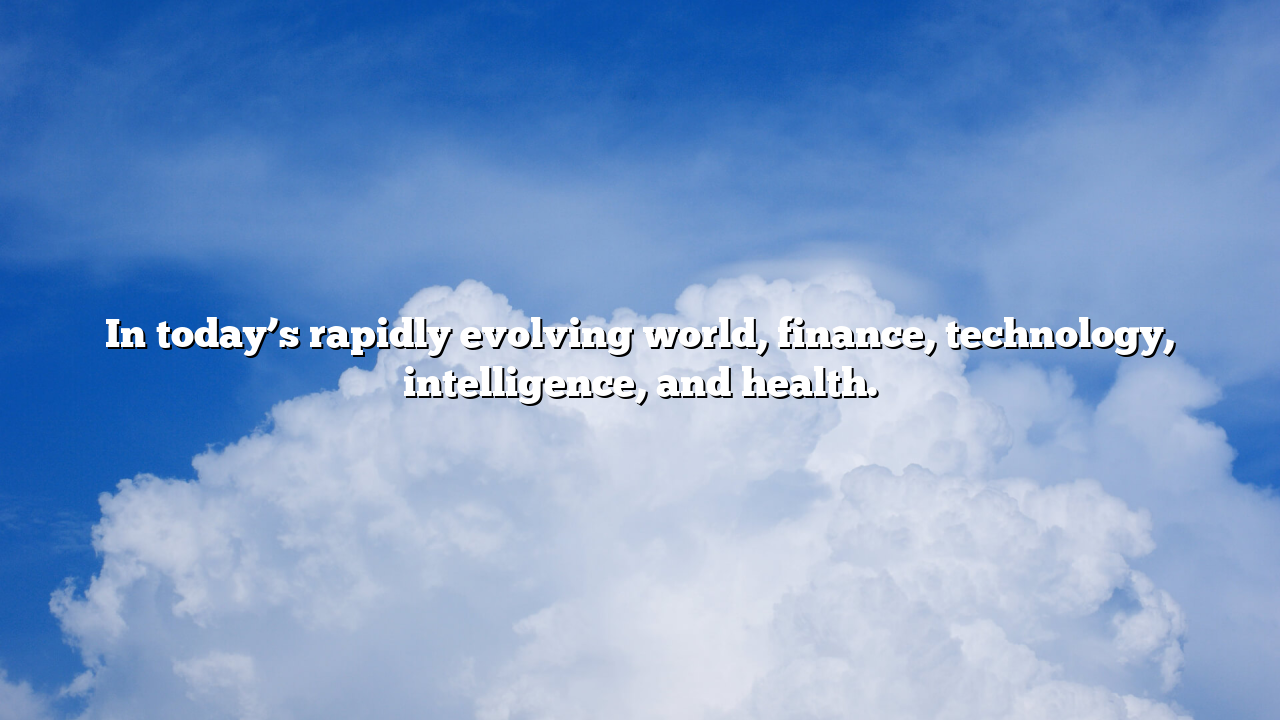These domains are interconnected and shape our everyday lives, but they provide new opportunities for individuals, businesses, and governments to advance, enhance, and achieve success. This discussion will cover how these fields combine, intersect, and impact modern living, ultimately paving the way for a prosperous, sustainable, and intelligent future.
—
1. Finance: The Backbone of Innovation
The financial sector has undergone a dramatic transformation with the advent of emerging technologies, AI, and decentralized finance. The traditional financial systems are being disrupted by innovations like cryptocurrency and blockchain. These innovations are altering the landscape of financial markets, investments, and digital exchanges.
Blockchain technology, for example, provides a secure and transparent way to record transactions without the need for centralized intermediaries like banks. This cuts down on transaction fees, increases transparency. Moreover, cryptocurrencies like Bitcoin and Ethereum offer individuals with alternative investment avenues and challenge traditional banking systems.
Another noteworthy trend in finance is the rise of intelligent algorithms and data analysis. These technologies enable banks, investment firms, and insurers to analyze vast amounts of data, predict market trends, and optimize investment portfolios The role of AI in finance is becoming more pronounced, with algorithms shaping investment strategies. Financial advisors can now leverage AI tools to offer better predictions, personalized recommendations, and optimized solutions.
—
2. Technology: Shaping the Future
Technology, in an era defined by technological progress, has been at the forefront of how we interact, create, and think. From digital tools like smartphones and cloud services to breakthroughs in quantum computing, technology has transformed every aspect of our lives.
In the field of healthcare, innovations such as telemedicine and wearable health devices have made healthcare more accessible. These technological advancements give individuals the ability to track their well-being, consult doctors online, and take control of their health.
The integration of AI in technology is also leading to breakthroughs in automation, problem-solving, and communication. AI-powered systems are redefining business practices in diverse sectors, including healthcare, manufacturing, and customer service. For instance, chatbots, AI-driven medical tools, and autonomous machinery are transforming industries that streamline processes, reduce human error, and elevate service quality.
—
3. Intelligence: The Human Brain Meets Artificial Systems
Human and artificial intelligence plays a critical role in how we solve problems, make decisions, and interact with others. Human intelligence has been enhanced through advancements in education, technology, and global connectivity. Meanwhile, artificial intelligence (AI) has introduced a game-changing element to the concept of intelligence.
AI has made significant strides in fields like natural language processing, machine learning, and data analysis. These systems mimic human cognition and allow us to solve complex problems faster. AI is already contributing to transportation, healthcare, and manufacturing, providing solutions that once seemed out of reach.
However, musang4d of AI with human expertise opens up debates on ethical dilemmas, data privacy, and autonomy. It is essential to develop AI in a way that safeguards human interests and rights.
—
4. Health: The Role of Technology and Intelligence in Wellness
Advances in healthcare have become more reliant on cutting-edge technology and intelligent systems. Wearables like fitness trackers, telehealth tools, smartwatches, and health monitoring apps are allowing individuals to track their health, manage conditions, and make better lifestyle choices. AI-powered tools is improving diagnosis, treatment plans, and patient outcomes.
Virtual healthcare services have increased accessibility to healthcare services in rural regions and developing countries. This technology is democratizing healthcare for people who would otherwise have limited access to care. Additionally, advancements in genetic research are allowing for more targeted treatments and preventative measures.
—
Conclusion
In conclusion, the fusion of finance, technology, intelligence, and health is creating a world of opportunities As these fields continue to evolve and converge Adapting to these changes will be important for individuals, businesses, and governments to stay competitive, relevant, and sustainable in the future.
